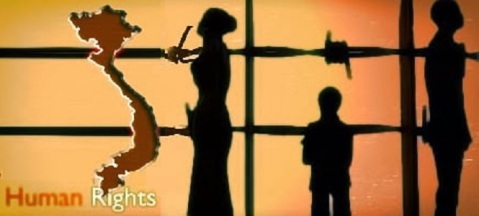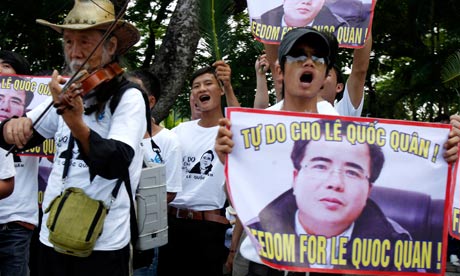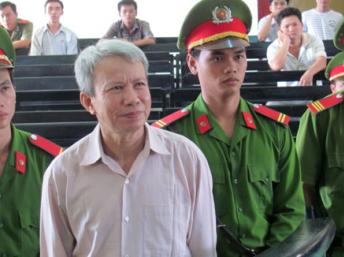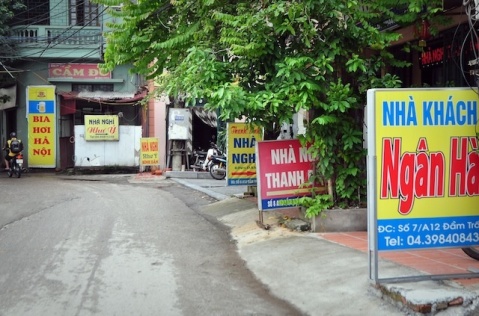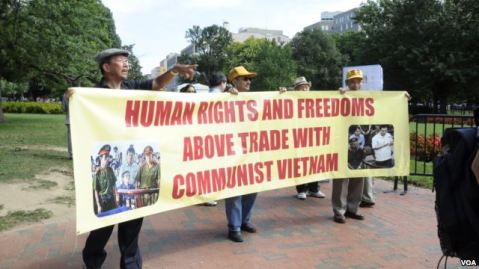Human Rights are still a dream for many
Phuong Duy
danlambaovn.blogspot.com
On 13 May 2010, Libya was elected to be one of 47 members of the United Nation Human Right Council (UNHRC). Despite its bad record of human rights violations under the cruel rule of the dictator Muanmar Gaddafi, the nation still managed to get 155 ‘yes’ votes to win a seat in the council (1). With this result, the United Nations has sparked a controversial argument around the world. In particular, it had to cope with a lot of criticisms from international non-governmental organizations (NGOs) such as Amnesty International (AI), Human Right Watch (HRW), Human Rights Without Frontiers (HRWF), World Organization Against Torture… for letting a regime as mean as Gaddafi’s win a comfortable seat of a body where it would be able to judge other states’ human rights situations (2). The rogue states such as China, Cuba, North Korea and Syria have seriously violated basical regulations of the Universal Declaration of Human Rights (UDHR) and constantly mistreated their own people. With their bad records, they should have been boycotted and banned from participating in this organization until their human rights situation improved. However, when ordinary people couldn’t rely on an international organization to protect them from barbarous acts, they made their own way. Just more than a year after taking that position in the human rights council, Lybia saw an uprising in Libya and on 20 Oct 2011, the Gaddafi’s dictatorial regime collapsed. The dictator was killed. Even a place in the UNHRC couldn’t save him and his supporters from their victims’ hatred. Libyan people have been liberated. Human rights in the state have improved since then.
The problem of giving seats in the UNHRC to bad nation states, unfortunately, still happens. Again, on 12 Nov 2013, nations including China, Vietnam, Cuba, Russia and some other states have managed to occupy seats in UNHRC for the 2014 – 2016 term (3). The human rights records of these nations are even far worse than those of Libya, but they took advantage of the UN General Assembly’s principles that no member may occupy a seat for more than two consecutive 3-year terms and all the seats are distributed on the basis of five geographical region groups: Asia, Africa, Latin America, Eastern Europe and Western Europe plus other groups (4). The success of these bad members was inevitable because it was the General Assembly’s principle that caused the problem itself. While in theory, the resolution establishing the UNHRC states that: ‘members elected to the Council shall uphold the highest standards in the promotion and protection of human rights’; in practice, the conduct of candidates hasn’t been examined cautiously; their human right violations has been bypassed. The number of candidates in each group was equivalent or less than those of available seats to vote, so the success of all candidates was almost 100%. Moreover, candidates didn’t even care to conceal their mangy bribe of votes amongst the UN members. The consequence was, ironically, the nations with the most human rights abuse record got the highest number of votes. (Vietnam: 184, China: 176 over a total of 193 votes).
The Network of Vietnamese Bloggers
As the international Human Rights Day is celebrated across the world, the Network of Vietnamese Bloggers today announced the establishment of their organization to promote and protect human rights in Vietnam. Following is their announcement:
To promote and protect human rights, including fundamental freedoms, democracy and dignity, we hereby announce the establishment of the Network of Vietnamese Bloggers. Human rights promotion and protection will remain our aim as long as there are widespread human rights violations in Vietnam.
Our core values are transparency, community spirit, democracy, pluralism, and inclusiveness. The network is and will remain non-partisan and non-profit.
The Network of Vietnamese Bloggers believes that the promotion of fundamental freedom is the prerequisite for the promotion of human rights. Every Vietnamese person must have the right to decide how to live his or her life and contribute to the development of our nation. Everyone must have the right to freedom of opinion and expression, including freedom to hold opinions without interference and to seek, receive and impart information and ideas through any media regardless of frontiers. Therefore, the Network of Vietnamese Bloggers, with all our capacity, shall commit itself to protecting people’s rights and freedoms from restrictions and censorship.
The Network of Vietnamese Bloggers believes that human rights are for the benefit of every person, as well as a prerequisite for progress of our society and a shared desire of all peoples. Human rights are universal, indivisible and interdependent; they must be for all. Consequently, the Network of Vietnamese Bloggers commits itself to protecting and promoting human rights in Vietnam and contributing to improving the respect for rights in our region and in the world.
The Network of Vietnamese Bloggers believes that every Vietnamese person must be treated with respect and must be considered equal in their pursuit of happiness. Thus, the creation of a liberal democracy, where difference and diversity are not only respected but also encouraged as an impetus for social development, is what all of us should aim for and is what has become an urgent need in this era.
The Network of Vietnamese Bloggers believes that human rights protection is the duty of everyone, not just a group of people, an organization or a government. We believe that it is the right and an obligation of every Vietnamese person to contribute to protecting the human rights, including fundamental freedoms and democracy and dignity of our country’s over ninety million people. The Network of Vietnamese Bloggers is an assembly of bloggers seeking to unite in our effort to fulfil this obligation.
If you agree to the goals, core values and beliefs of the Network of Vietnamese Bloggers, you could consider yourself a member of the Network. You are welcome to come together with other members in talking about human rights inside and outside the country, raising public awareness about human rights, defending victims of human rights violations, empowering bloggers’ capacities, and monitoring the human rights performance of the authorities.
Let us join forces to overcome fear and raise the hope of change for a new Vietnam now and for generations to come; let us strive to promote and protect human rights, including fundamental freedoms, equality, and dignity for all Vietnamese people in order to help create a new future for Vietnam.
December 10, 2013
The Network of Vietnamese Bloggers
mangluoiblogger.blogspot.com
facebook.com/MangLuoiBlogger
twitter.com/mangluoiblogger
mangluoiblogger@gmail.com
VN government successfully demolished a religious building
A video recorded the government officials in Vietnam successfully cleared out hundreds of minority people to demolish their religious building.
Vietnam dissident Le Quoc Quan jailed for ‘tax evasion’
The Guardian
US trained lawyer Le Quoc Quan denounces 30-month sentence saying he is the ‘victim of political acts’
Hanoi (AP) – A Vietnamese court sentenced a US-trained lawyer and well known dissident to 30 months in jail on Wednesday after finding him guilty on tax evasion – charges widely considered to be politically motivated.
The case against Le Quoc Quan had been followed closely by the US government, which is pressing Vietnam’s communist leaders to loosen their restrictions on those advocating democracy and human rights.
Quan maintained his innocence during the one-day trial in the capital of Hanoi.
“I have long been denouncing and fighting against corruption, bureaucracy and the stagnation that is doing harm to this country … I’m the victim of political acts,” Quan said after the sentence was handed down.
Quan carried on speaking, but the audio feed into a side-room where a small number of reporters and diplomats were allowed to listen to proceedings was then cut off.
Presiding Judge Le Thi Hop said Quan was found guilty of evading corporate income tax of $30,000 (£18,000) in relation to a consultancy he had headed. Quan was arrested last December in Hanoi.
Trials in Vietnam do not meet international standards for fairness, according to human rights groups.
Many hundreds of police and other security officers were stationed in the streets around the court preventing people from getting close. Around 100 of Quan’s supporters rallied at a church and in streets elsewhere in the city, shouting: “Justice for innocent people.”
Quan was detained in 2007 for three months on his return from a US government-funded fellowship in Washington. He is one of Vietnam’s better-known dissidents and maintained a popular blog that highlighted human rights abuses and other issues off-limits to the state media.
Vietnam converted to a market economy in the late 1980s and wants to integrate with the world, but maintains strict controls on freedom of speech and political expression. Bloggers, activists and others are routinely arrested and imprisoned. Foreign media representatives are allowed to live in Vietnam but are subject to restrictions on where they can travel and what they can report.
The internet has emerged as a vital organising tool for dissidents in recent years, and there has been a surge of blogs and Facebook pages highlighting criticism of the government. The rise of the internet, combined with an economic slowdown, has left the ruling elite feeling vulnerable.
As of June 2013, Vietnam was holding more than 120 political prisoners according to U.S. officials.
Vietnamese Online Activist Ordered Jailed for 15 Years
An Nguyen and Richard Finney
RFA
A court in Vietnam’s south-central coastal province of Phu Yen has sentenced an online activist to 15 years in prison on charges of plotting to overthrow the country’s one-party communist government, sources said today.
The sentence, to be followed by five years of probation, was handed down to Ngo Hao, a former soldier, on Wednesday in accordance with Article 79 of Vietnam’s penal code, which forbids “carrying out activities aimed at overthrowing the people’s administration.”
Hao, aged about 65, was arrested on Feb. 8 and charged only because of his online writings on behalf of other dissidents, his son Ngo Minh Tam told RFA’s Vietnamese Service today.
“He has always argued that his activities were not wrong, and that the only thing ‘wrong’ is that they have not been accepted by the government,” Tam said.
“But whenever he opened his mouth to say something, they would not let him speak,” he said.
Hao, who was flanked in court by two policemen, showed signs of exhaustion throughout the morning-long trial, Tam said.
“My father’s health is not good,” he said, adding, “From 7:30 when the trial started until 9:30 he was so tired that the court had to adjourn for 20 minutes.”
“At 11:30, he was tired again, but they said he had to remain until the verdict was delivered.”
Support for other dissidents
Hao said before his trial that he had tried in his writings to support other Vietnamese activist groups—such as jailed members of the Bia Son environmental group and Hoa Hao religious minority—who had asked him to seek help on their behalf from the U.N. and rights group Human Rights Watch.
“[The authorities] used these writings, which had spread online, as the basis for their charges against him,” said his son.
Family members had received notice of Hao’s trial only a week before, and could not afford a lawyer to represent him, Tam said.
“They did arrange a lawyer for my father, but this was just a procedure,” he said.
Though Tam had been allowed to attend the trial, his mother and a younger sibling had been barred from the court, he added.
Charges in Hao’s indictment specified that from 2008 to Dec. 2012 he had collected, written, and spread essays and other documents “vilifying [Vietnam’s] government and leaders” and had sought to inspire an Arab Spring-type revolution in the one-party communist state using “nonviolent means.”
Hao, who had served in the South Vietnamese army before 1975, was also accused of receiving a total of U.S. $1,500 in several payments from exile groups to be distributed among other democracy activists, the indictment charged.
Vietnam has jailed more than 40 bloggers and activists this year amid a crackdown on online dissent that has intensified over the past three years, convicting many of them under vaguely worded national security provisions, according to rights groups.
Paris-based media watchdog Reporters Without Borders ranks Vietnam 172nd out of 179 countries on its press freedoms index and lists the country as an “Enemy of the Internet.”
Vietnam Won’t Stop Locking Up Its Bloggers
Faisal Islam
Vice.com
Vietnam is not a good place to be a blogger. At least, it’s not a good place to be a blogger if you actually want to write what’s on your mind. In the last month or so, three bloggers have been arrested for criticizing the communist government, or—as Vietnamese authorities deftly put it—”abusing democratic freedoms” by posting their opinions online. While that charge might seem like a bit of a paradox, their prospects post-arrest aren’t looking great. On May the 16th, another blogger, Dinh Nguyen Kha, was sentenced to ten years in jail for “distributing anti-State propaganda” and “deliberately causing injuries”.
Those arrests are just one of the issues that spurred former US congressman Joseph Cao into calling Vietnam, “The worst violator of human rights in Southeast Asia” (and that’s including Burma, a country where the Rohingya Muslim minority are being systematically wiped out, allegedly with tacit approval from the government). Other issues worthy of some credit for that title include outlawing political opposition to the one-party state, repressing dissidents, severely restricting freedom of expression and arresting, imprisoning and torturing peaceful activists.
Alongside all that intimidation, there’s also the side issue of relentless propaganda to put up with as you go about your day. Whether you’re watching TV, surfing the internet, or simply walking down the street, Vietnam’s propaganda push is ubiquitous. In the capital city of Hanoi, the government rhetoric starts at around 6:45 AM, blasted out of loudspeakers once used to warn locals about impending American airstrikes.
Today, messages range from the humdrum—”Don’t forget to pay your taxes,” for example—to the deification of the government and its leaders. It’s not quite 1984, but it’s not exactly normal, either—imagine being woken up every day with lectures on socialism and warnings of “social evils” rather than building work that seems designed specifically to f*ck with you. Perhaps equally irritating, but way more likely to bum you out for the entire day. “We generally try to ignore the speakers,” says street vendor Hong Minh in the capital’s Old Quarter. “But they’re really annoying, so it’s pretty difficult.”
Spooked by uprisings during the Arab Spring, China’s wanton land-grabbing and unprecedented domestic criticism, the government has used the past year to squeeze even harder on the throat of free speech through a raft of reforms. With independent media prohibited (all agencies must obtain a licence from the state), lawmakers have turned their attentions to the internet. In December, Prime Minister Nguyễn Tấn Dũng called on his security forces to increase the battle against “hostile forces” (which translates to “free speakers” outside of Vietnam) using the net to “spread propaganda which threatens national security.”
Internet access is already tightly controlled, with many pro-democracy websites banned and the majority of public computers monitored for anti-establishment activity. But, unsurprisingly, it doesn’t stop there. The government seems to be fighting all types of technology, recently declaring that Vietnam wasn’t ready for 4G phone services and wouldn’t licence the technology at least until 2015. Given the fact that the nation is home to over 117 million mobile phone subscribers and iPads are nearly as common as paddy fields, critics suggested that the real reason may have been that the government’s filters weren’t yet ready to handle the new technology.
Broadcast media (again, strictly licensed) is also becoming choked. Already beamed with a 30-minute delay to ensure that “sensitive information” can be purged, CNN and BBC news channels disappeared entirely from many TV screens last month as cable providers responded to a new government law decreeing that a large amount of content on foreign channels must be subtitled into Vietnamese. The translation and editing would be conducted by an agency licensed by the government, checking to make sure the content is “appropriate to the people’s healthy needs and does not violate Vietnamese press law”. So censorship, effectively.
Exploring Vietnam’s Lunchtime Sex Motels
Jak Phillips
Vice.com
Vietnam has its priorities firmly in place. A pack of Marlboro Reds is cheaper than a cup of coffee, a liter of Hanoi Vodka costs less than a box of cereal, and the best part of two months each year are given over to a huge party called Tết, which is kind of like New Year’s Eve and Mardi Gras rolled into one, but with a few more firecrackers, masks, and games of “catch the duck blindfolded” (note: that is not a euphemism).
But it’s at lunchtimes when Hanoi, the country’s capital, really comes into its own. While the rest of us are stuck wrestling with a cost-benefit analysis of splashing an extra buck on a sandwich with real animal meat in it, horny Hanoians are meeting in specialized motels called Nha Nghis across the city for some afternoon delight.
The Nha Nghi (which translates to “rest house”) is a fairly modern phenomenon, but in the past decade the hotels have sprung up throughout the country’s major cities, and it’s easy to see why they’re so popular among people sneaking in quickies with either their lover, a stranger they met online, or a prostitute. Considering they start at just three dollars an hour, the rooms are remarkably clean and well-furnished. The one I checked out in Hanoi’s Long Biên district reminded me a bit of a Travelodge, only without the continental breakfast of cereal and stale danishes.
In Vietnam, sex before marriage is common but still considered a bit too taboo to engage in openly, so Nha Nghis provide the ideal cover for young lovers eager to escape the judgment of their parents. But the hotels aren’t just for the young—adults all the way into their late 60s rendezvous with their bit on the side at Nha Nghis. Some of them book rooms months in advance for Valentine’s Day and public holidays. Officially, the national sport is đá cầu (it’s sort of like badminton with your feet); unofficially, it’s doin’ it.
“Contrary to their repressed image in the West, Vietnamese people are actually very liberal and affairs are extremely common,” one hotel worker informed me. “My ex-partner was a wealthy man and would meet up with three or more girls a week. When it’s so easy to hook up, Vietnamese find it difficult to be faithful—especially the men.“
As with most tales of 21st century sordidness, the internet had a large role to play in the explosion of Nha Nghis. Yahoo Chat became wildly popular in Vietnam during the mid-2000s and, all of a sudden, cyber Casanovas had an endless amount of potential partners to poke, persuade, and plead into the sack. All they needed was a place to do the deed.
Hung, a borderline sexual deviant who claims to have bedded over 60 girls in Nha Nghis across a two-year period before doing the “honorable thing” and marrying the first girl he impregnated, said chatrooms gave a new lease on life to his brand of no-strings-attached recreation. “For me, it was very simple—I would say some nice things to a girl and let things move on from there,” he told me. “Once we’re talking, I can date her; once we date, I can kiss her; once I kiss her, I can touch her boobs; and once that happens I can f*ck her.”
Israel Chemicals to develop phosphate mine in Vietnam
Yoram Gabison
Haaretz
Israeli miners’ union says government allowing jobs to go overseas by holding up new Negev phosphate mine.
In a bid to diversify the sources of its raw materials, Israel Chemicals said on Monday it was planning to open a phosphate mine and processing plant in Vietnam together with a local company.
The joint venture with Duc Giang will market phosphate products primarily in Vietnam and nearby Southeast Asian, the Israel Chemicals said in a statement. The two sides signed on Monday a memorandum of understanding in a ceremony attended by Vietnam’s ambassador to Israel. They plan to extract phosphate and manufacture downstream products based on the chemical.
“Both ICL and Duc Giang believe their cooperation will be productive and serve as the basis for the further expansion and intensification of cooperation between the two companies in Vietnam and surrounding countries,” Israel Chemicals said.
Last month, Israel Chemicals said it planned to grow the company by expanding its sources of potash and phosphate, which are two of the primary raw materials used in its products. Phosphates are key to the company’s food and agricultural products and engineered materials.
Despite the announcement, shares of Israel Chemicals fell 1.4% in the Tel Aviv Stock Exchange trading Monday to NIS 24.95.
Israel Chemicals said the Vietnam project would not replace the company’s three phosphate mines in Israel’s Negev desert, but would reduce its dependence on them. The Negev mines are expected to exhaust their reserves sometime in the next seven to 10 years. The Health Ministry has so far blocked the company from receiving permits to establish a new mine in Sde Barir near the desert town of Arad. Residents have objected to opening a mine nearby, citing concerns over radiation.
The proposed Sde Barir mine has pitted the interests of some local residents against the interests of organized labor at Israel Chemicals.
Moshe Hadad, head of the union representing workers at Israel Chemicals’ mining subsidiary, Rotem Amfert Negev, said the mine would be economically beneficial to the region and criticized Health Minister Yael German for blocking permits.
“The agreement signed by ICL and Duc Giang is transferring the phosphate mining industry from Israel to Vietnam with the loss of livelihood for 10,000 Negev residents,” he said. Hadad called on Finance Minister Yair Lapid to intervene and help cut the red tape.
And together we celebrate our first victory…
Dieu Quyen
Danlambao Blog
For the many people who have been fighting for and supporting the democratic movement in Viet Nam, today was a highly charged day indeed. Today, the 16th August 2013, the so called People’s Court of Long An held the trial of two young students Nguyen Phuong Uyen and Dinh Nguyen Kha. Previously they were both charged with distributing the yellow flag of the old regime and leaflets bearing anti China, anti government slogans, with 6 years in prison for Phuong Uyen and 8 years for Nguyen Kha.
For days, the families and friends of the two young patriots were trying hard to visit them prior to the trial. They were met with much difficulties from the prison officials. The mother of Nguyen Kha, Mrs Kim Lien, was not allowed to see her son, which caused her considerable distress. Only the solicitors were allowed to have a quick few words, who assured that despite a lot of pressure and threats and even beatings from prison guards, the two youngsters remained calm and with good spirits.
Today, from early in the morning, hundreds of police and police vans were moved to the front of the Court. As the supporters arrived, they were blocked off , chased away and threatened. Despite this being supposedly an open trial, no one was even allowed near the Court, let alone inside. A few bloggers holding banners which said “Phuong Uyen and Nguyen Kha are innocent “were chased after and arrested, their banners taken away and torn. When a few people, including a mother and her young toddler, were put in one of those police vans to be carted away, the remained all lied down in front of the vans to block the road. They also held hands and walked around chanting “Freedom for Uyen and Kha”, “Uyen and Kha are innocent”. It was total chaos right at the front gate of the Court.
Even the mothers of Uyen and Kha, Mrs Nhung and Mrs Kim Lien, were not allowed inside the Court. Mrs Nhung stood outside the closed front gate, leaned her head against the metal rails and sobbed uncontrollably. The Communist flag, bloody red with the people’ s blood, flew silently above her. It was a picture that went viral on Facebook and caused a lot of anger among those concerned.
While the families and the supporters were holding their vigil outside the Court, thousands more, myself included, from all over the world were sitting glued to their computers, following each bit of news which managed to get past the police blockage. Every tiny bits of information were quickly shared around on the Net, from Facebook to Paltalk to Yahoo Messengers… Emotions were running sky high. At the end of the day, when the final decision was delivered: Nguyen Phuong Uyen’s sentence reduced from 6 years to 3 years probation, Dinh Nguyen Kha ‘ s sentence reduced from 8 years to 4 years in prison, one could almost hear the screams of victory from the words that went flying across the computer screen.
Indeed, this is the very first victory for those fighting for democracy for Viet Nam. This is the first time someone went to Court with such charges walk out without a prison term. Although this is only a small victory, it is still significant enough to give the people hope. There is light at the end of the tunnel finally. Those more cautious reminded us that there were still hundreds of dissidents and prisoners of conscience behind bars, infact Nguyen Kha is still imprisoned, so that one can not let one’s guard down but to continue to fight even more fiercely to free the remained.
The truth is though, most people are fully aware that this does not yet signify any good intention from the Communist Government. People still remember very clearly that not so long ago, Viet Nam President Mr Truong Tan Sang had a meeting with Mr Obama, the President of the United States, and human rights issues were seriously discussed. It was obvious that for the US to grant Viet Nam any significant benefit, the Vietnamese Communist Party would have to reduce its violations of human rights.
Viet Nam has been desperate to join the TPP (Trans Pacific Strategic Economic Partnership) to save its failing economy and has been bidding for a membership of the United Nations Human Rights Council for years. It is obvious to those who have been watching, that Viet Nam would have to back down quite seriously on its policy against peaceful dissidents to be accepted into either one or both of the organisations. It looks like the first step the Communist Vietnamese Government decided to take in this direction is to release Phuong Uyen, a female and also the youngest of those ever arrested and charged.
In the foreseeable future, those advocating for democracy for Viet Nam still have a hard battle to wage. Much pressure from inside and outside the country is still needed, with a lot of support from various human rights organisation, to be able to force the Vietnamese authority to slowly release the remaining political prisoners.
Still, for now, victory is sweet, and many are celebrating!
Vietnamese Americans protest Vietnam’s communist leader Truong Tan Sang
This gallery contains 12 photos.
